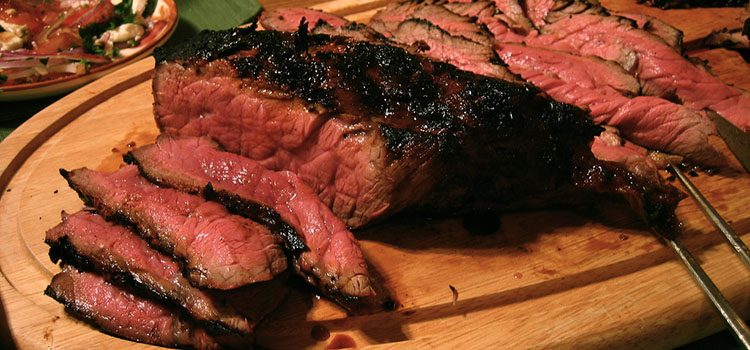Study: Protein May Lower Blood Pressure

Jeremy Keith via Flickr | http://bit.ly/1yiCYYT
(Inside Science) -- Eating too much meat often makes the headlines, whether the risk of doing so is equated to smoking or cited as the cause of rising diabetes rates. All the buzz has many of us pondering the same question: Am I eating too much meat?
Though some of these articles have already been labeled as “sensational journalism,” a new study published in the American Journal of Hypertension has shown that people who eat more protein -- whether from plant or animal sources -- tend to have a lower risk of hypertension, also known as high blood pressure.
Study author Lynn L. Moore, an epidemiologist from Boston University School of Medicine, said this marks a move away from the characterization that meat is bad, but other epidemiologists have questioned the value of her results.
Using data from the Framingham Heart Study, a national campaign that began collecting data on young adults in the early 1970s, Moore and her co-authors were able to compare diet with blood pressure readings. In total, they analyzed data from nearly 3,300 healthy individuals over an 11-year period.
“Those who consumed about 20 percent more protein than the recommended daily allowance had a lower risk of developing high blood pressure,” said Moore.
She found that the study participants who ate the most dietary protein had a 40 percent lower risk of high blood pressure compared to those who consumed the least protein.
Moore noted that the research team also looked at overweight individuals with a BMI of 25 or higher and the observed beneficial effect of protein remained.
“Interestingly though, going back 30 years there weren’t a lot of people in the obese category,” she said, “but I can’t see why a high protein intake wouldn’t also help those people to lower their blood pressure.”
Dr. Mariana Markell, a nephrologist and associate professor of medicine from SUNY Downstate Medical Center in New York City, harbors doubts about Moore’s findings. She thinks the observed association can be explained away by looking at carbohydrate intake, not protein. It’s true the participants who consumed the least protein were more likely to develop high blood pressure, but Markell points out that the proportion of carbohydrates eaten by this group was also much higher.
“That really complicates things. Carbohydrate intake was not controlled for in their analysis and is well known to affect the risk of hypertension.”
Markell also downplays Moore’s hope that her results would translate for less healthy individuals who are already at risk of developing high blood pressure.
“Anyone with diabetes, kidney disease or hypertension was excluded from the analysis,” she said, adding this would mean the results were only meaningful to healthy people. “The analysis was further muddled by the fact that some people began treatment for hypertension.”
Other experts have taken more of a middle ground approach. Dr. Richard B. Hayes, the director of New York University’s Division of Epidemiology, said that Moore's team has done a good job with the data they had.
“The study seems to shed light on a potential aspect of blood pressure control that’s not getting a lot of attention, but we shouldn’t get ahead of ourselves — more work needs to be done,” said Hayes.
“They’ve isolated an effect, but that poses a further question: Is protein intake what actually caused it?” asked Hayes.
He added that he’d like to see a more vigorous clinical trial to follow up and draw meaningful conclusions.
“Protein is a really important need for the functioning of the human body,” said Moore. As far as blood pressure goes, Moore said that meat -- whether a prime rib steak or a low fat chicken breast -- would help to lower it. “We’ve shown there’s no evidence that protein [from meat] is bad for the health of people concerned with heart disease and stroke. At the very least, they should be eating the recommended daily allowance of protein.”
She added that protein intake from any source -- plant, meat or dairy -- needs to be part of a balanced diet that includes vegetables and fiber. For other health concerns besides hypertension, Moore said that avoiding fatty meats or opting for a meat alternative wouldn’t be a bad idea and would still yield a blood pressure advantage.
Previous studies have linked processed and red meats to colorectal cancer and the American Institute for Cancer Research recommends no more than 18 ounces (cooked weight) of beef, pork or lamb should be consumed in a week.
Moore agreed.
“For individuals concerned about cancer, I would recommend they consume protein from a number of sources and limit red meat.”
Of a different opinion, Markell wouldn’t advise anyone to change their diets based on this paper.
“The big issue is carbohydrate intake, especially of simple sugars, and its effects on insulin and other hormones that affect blood pressure.”

